Investigating the Impact of Teaching Quality on Student Performance
VerifiedAdded on 2023/04/21
|6
|1466
|370
Report
AI Summary
This report delves into the critical area of educational research, focusing on the impact of teaching quality on student performance, particularly within the Malaysian higher education context. It begins by defining educational research as a systematic method to enhance the education system, highlighting its scientific and methodical nature, involving problem identification, data collection, analysis, and interpretation. The report emphasizes the importance of classroom research conducted by teachers for prompt action and assessment. It presents a research problem centered on how the quality of classroom instructions affects student performance, acknowledging various influencing factors like student intellect, curriculum quality, and socioeconomic background. The research questions address how Malaysian students rate teaching quality, how to improve it, and the effectiveness of student feedback. The literature review discusses the negative impact of teacher turnover on student achievement and the importance of teacher-student interactions, stressing the need for effective teaching to reduce achievement gaps and considering student opinions for curriculum improvement. The report concludes by referencing various studies that support the correlation between teaching quality and student outcomes, emphasizing the need for continuous improvement in teaching methodologies.
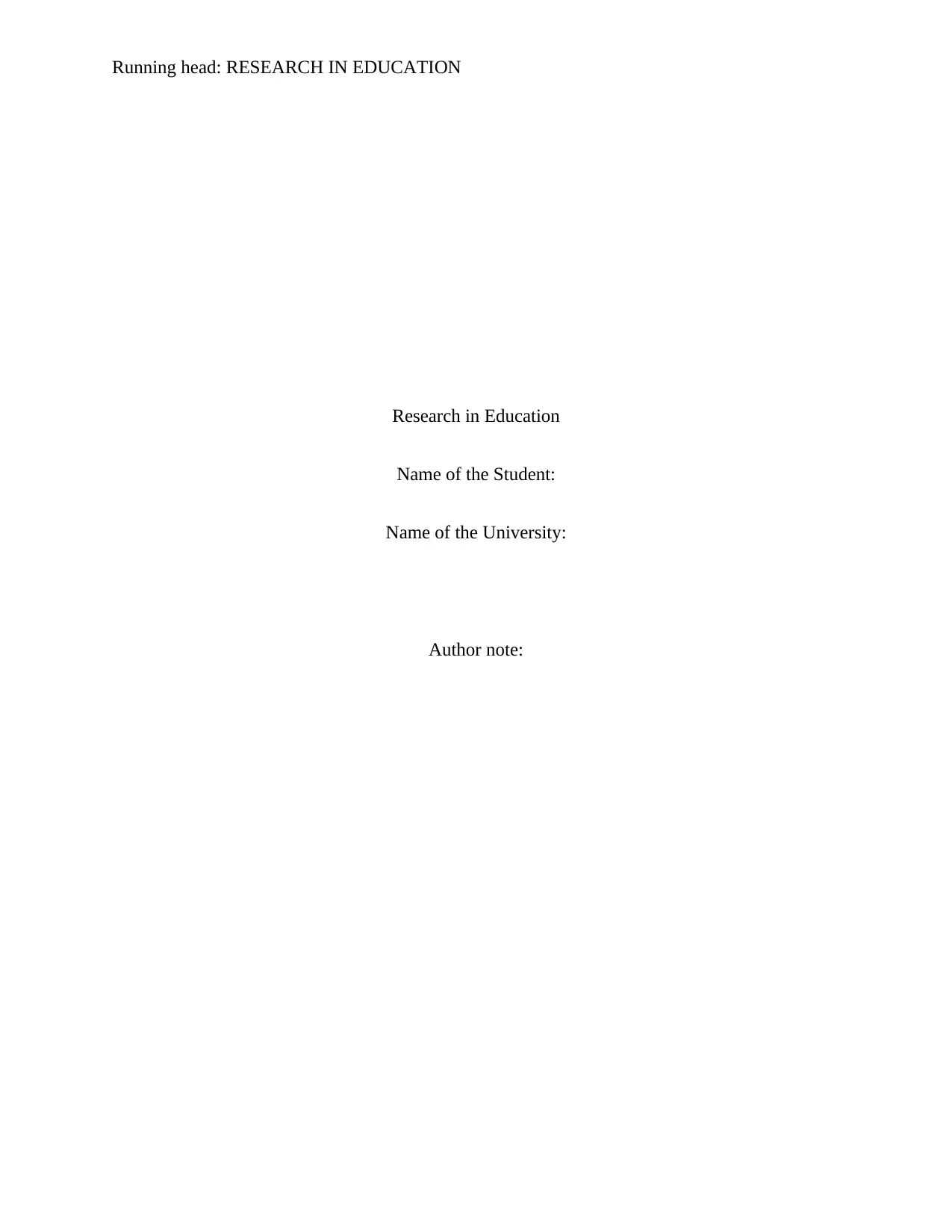
Running head: RESEARCH IN EDUCATION
Research in Education
Name of the Student:
Name of the University:
Author note:
Research in Education
Name of the Student:
Name of the University:
Author note:
Paraphrase This Document
Need a fresh take? Get an instant paraphrase of this document with our AI Paraphraser
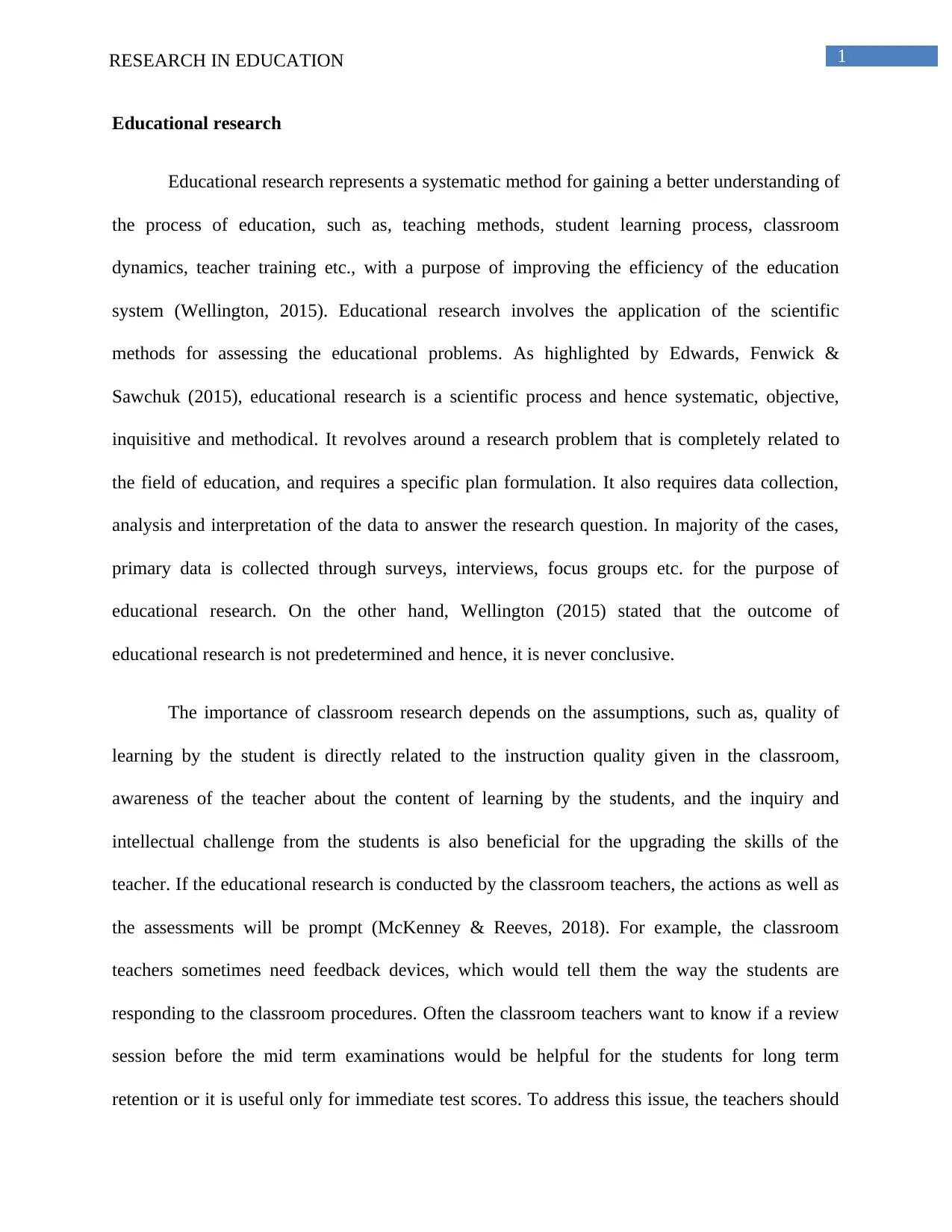
1RESEARCH IN EDUCATION
Educational research
Educational research represents a systematic method for gaining a better understanding of
the process of education, such as, teaching methods, student learning process, classroom
dynamics, teacher training etc., with a purpose of improving the efficiency of the education
system (Wellington, 2015). Educational research involves the application of the scientific
methods for assessing the educational problems. As highlighted by Edwards, Fenwick &
Sawchuk (2015), educational research is a scientific process and hence systematic, objective,
inquisitive and methodical. It revolves around a research problem that is completely related to
the field of education, and requires a specific plan formulation. It also requires data collection,
analysis and interpretation of the data to answer the research question. In majority of the cases,
primary data is collected through surveys, interviews, focus groups etc. for the purpose of
educational research. On the other hand, Wellington (2015) stated that the outcome of
educational research is not predetermined and hence, it is never conclusive.
The importance of classroom research depends on the assumptions, such as, quality of
learning by the student is directly related to the instruction quality given in the classroom,
awareness of the teacher about the content of learning by the students, and the inquiry and
intellectual challenge from the students is also beneficial for the upgrading the skills of the
teacher. If the educational research is conducted by the classroom teachers, the actions as well as
the assessments will be prompt (McKenney & Reeves, 2018). For example, the classroom
teachers sometimes need feedback devices, which would tell them the way the students are
responding to the classroom procedures. Often the classroom teachers want to know if a review
session before the mid term examinations would be helpful for the students for long term
retention or it is useful only for immediate test scores. To address this issue, the teachers should
Educational research
Educational research represents a systematic method for gaining a better understanding of
the process of education, such as, teaching methods, student learning process, classroom
dynamics, teacher training etc., with a purpose of improving the efficiency of the education
system (Wellington, 2015). Educational research involves the application of the scientific
methods for assessing the educational problems. As highlighted by Edwards, Fenwick &
Sawchuk (2015), educational research is a scientific process and hence systematic, objective,
inquisitive and methodical. It revolves around a research problem that is completely related to
the field of education, and requires a specific plan formulation. It also requires data collection,
analysis and interpretation of the data to answer the research question. In majority of the cases,
primary data is collected through surveys, interviews, focus groups etc. for the purpose of
educational research. On the other hand, Wellington (2015) stated that the outcome of
educational research is not predetermined and hence, it is never conclusive.
The importance of classroom research depends on the assumptions, such as, quality of
learning by the student is directly related to the instruction quality given in the classroom,
awareness of the teacher about the content of learning by the students, and the inquiry and
intellectual challenge from the students is also beneficial for the upgrading the skills of the
teacher. If the educational research is conducted by the classroom teachers, the actions as well as
the assessments will be prompt (McKenney & Reeves, 2018). For example, the classroom
teachers sometimes need feedback devices, which would tell them the way the students are
responding to the classroom procedures. Often the classroom teachers want to know if a review
session before the mid term examinations would be helpful for the students for long term
retention or it is useful only for immediate test scores. To address this issue, the teachers should
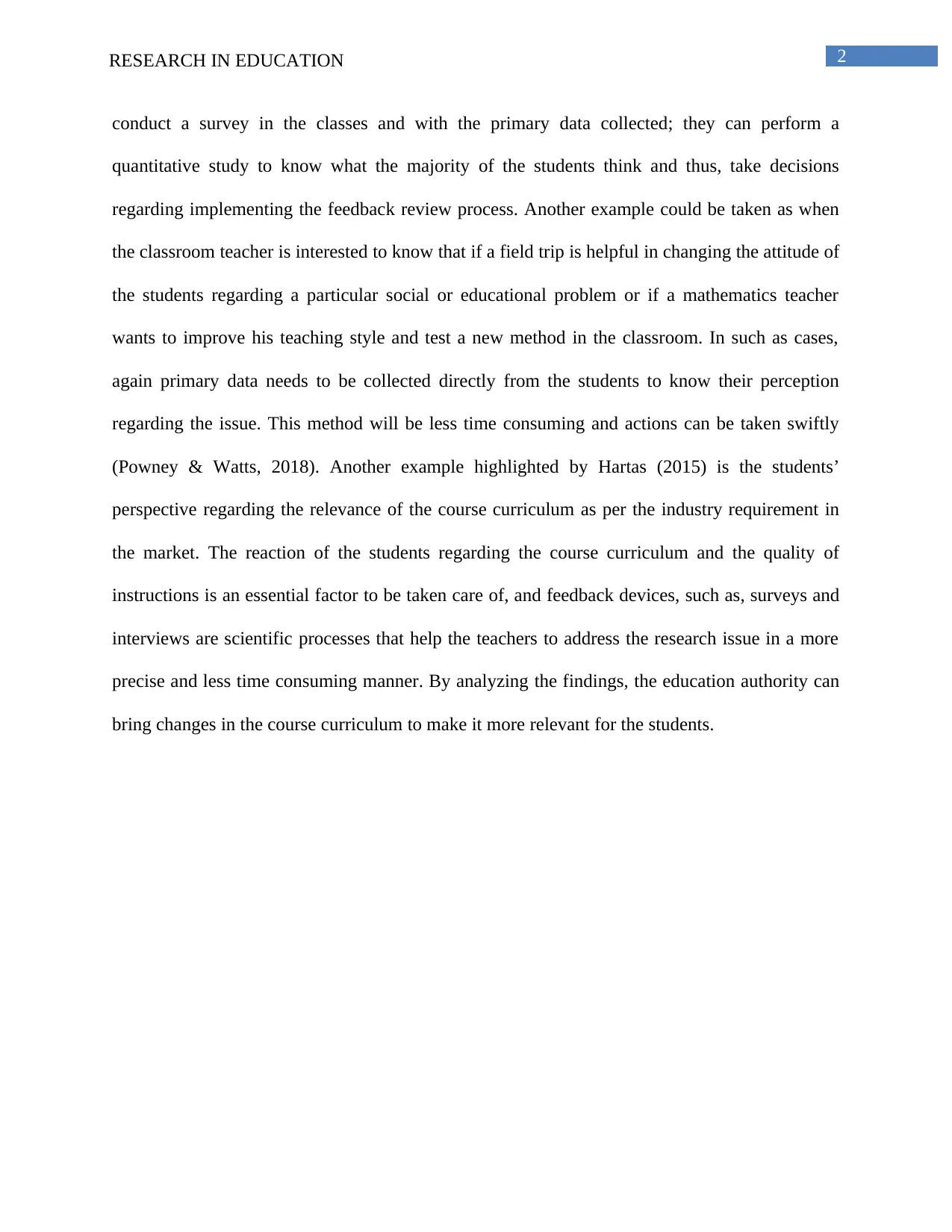
2RESEARCH IN EDUCATION
conduct a survey in the classes and with the primary data collected; they can perform a
quantitative study to know what the majority of the students think and thus, take decisions
regarding implementing the feedback review process. Another example could be taken as when
the classroom teacher is interested to know that if a field trip is helpful in changing the attitude of
the students regarding a particular social or educational problem or if a mathematics teacher
wants to improve his teaching style and test a new method in the classroom. In such as cases,
again primary data needs to be collected directly from the students to know their perception
regarding the issue. This method will be less time consuming and actions can be taken swiftly
(Powney & Watts, 2018). Another example highlighted by Hartas (2015) is the students’
perspective regarding the relevance of the course curriculum as per the industry requirement in
the market. The reaction of the students regarding the course curriculum and the quality of
instructions is an essential factor to be taken care of, and feedback devices, such as, surveys and
interviews are scientific processes that help the teachers to address the research issue in a more
precise and less time consuming manner. By analyzing the findings, the education authority can
bring changes in the course curriculum to make it more relevant for the students.
conduct a survey in the classes and with the primary data collected; they can perform a
quantitative study to know what the majority of the students think and thus, take decisions
regarding implementing the feedback review process. Another example could be taken as when
the classroom teacher is interested to know that if a field trip is helpful in changing the attitude of
the students regarding a particular social or educational problem or if a mathematics teacher
wants to improve his teaching style and test a new method in the classroom. In such as cases,
again primary data needs to be collected directly from the students to know their perception
regarding the issue. This method will be less time consuming and actions can be taken swiftly
(Powney & Watts, 2018). Another example highlighted by Hartas (2015) is the students’
perspective regarding the relevance of the course curriculum as per the industry requirement in
the market. The reaction of the students regarding the course curriculum and the quality of
instructions is an essential factor to be taken care of, and feedback devices, such as, surveys and
interviews are scientific processes that help the teachers to address the research issue in a more
precise and less time consuming manner. By analyzing the findings, the education authority can
bring changes in the course curriculum to make it more relevant for the students.
⊘ This is a preview!⊘
Do you want full access?
Subscribe today to unlock all pages.

Trusted by 1+ million students worldwide
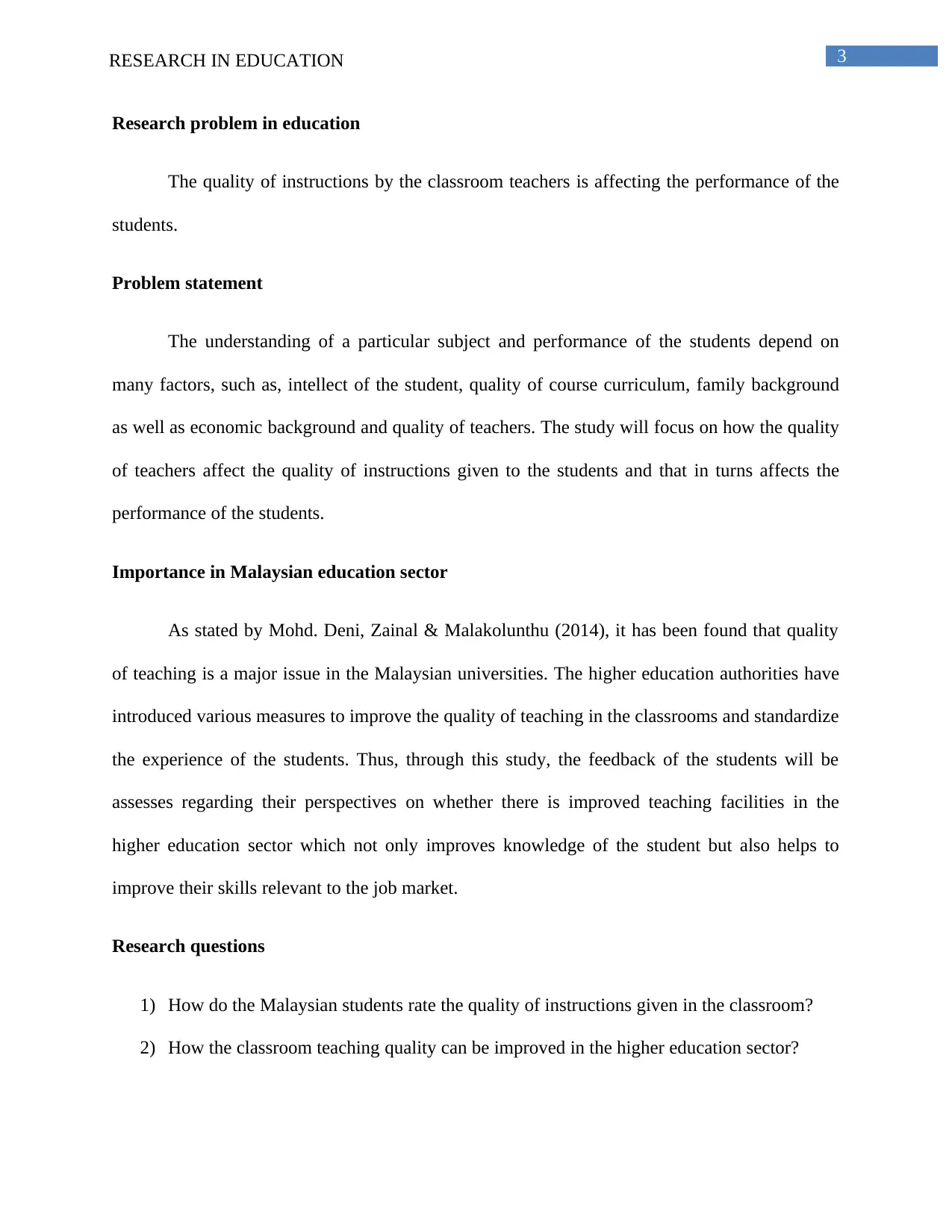
3RESEARCH IN EDUCATION
Research problem in education
The quality of instructions by the classroom teachers is affecting the performance of the
students.
Problem statement
The understanding of a particular subject and performance of the students depend on
many factors, such as, intellect of the student, quality of course curriculum, family background
as well as economic background and quality of teachers. The study will focus on how the quality
of teachers affect the quality of instructions given to the students and that in turns affects the
performance of the students.
Importance in Malaysian education sector
As stated by Mohd. Deni, Zainal & Malakolunthu (2014), it has been found that quality
of teaching is a major issue in the Malaysian universities. The higher education authorities have
introduced various measures to improve the quality of teaching in the classrooms and standardize
the experience of the students. Thus, through this study, the feedback of the students will be
assesses regarding their perspectives on whether there is improved teaching facilities in the
higher education sector which not only improves knowledge of the student but also helps to
improve their skills relevant to the job market.
Research questions
1) How do the Malaysian students rate the quality of instructions given in the classroom?
2) How the classroom teaching quality can be improved in the higher education sector?
Research problem in education
The quality of instructions by the classroom teachers is affecting the performance of the
students.
Problem statement
The understanding of a particular subject and performance of the students depend on
many factors, such as, intellect of the student, quality of course curriculum, family background
as well as economic background and quality of teachers. The study will focus on how the quality
of teachers affect the quality of instructions given to the students and that in turns affects the
performance of the students.
Importance in Malaysian education sector
As stated by Mohd. Deni, Zainal & Malakolunthu (2014), it has been found that quality
of teaching is a major issue in the Malaysian universities. The higher education authorities have
introduced various measures to improve the quality of teaching in the classrooms and standardize
the experience of the students. Thus, through this study, the feedback of the students will be
assesses regarding their perspectives on whether there is improved teaching facilities in the
higher education sector which not only improves knowledge of the student but also helps to
improve their skills relevant to the job market.
Research questions
1) How do the Malaysian students rate the quality of instructions given in the classroom?
2) How the classroom teaching quality can be improved in the higher education sector?
Paraphrase This Document
Need a fresh take? Get an instant paraphrase of this document with our AI Paraphraser
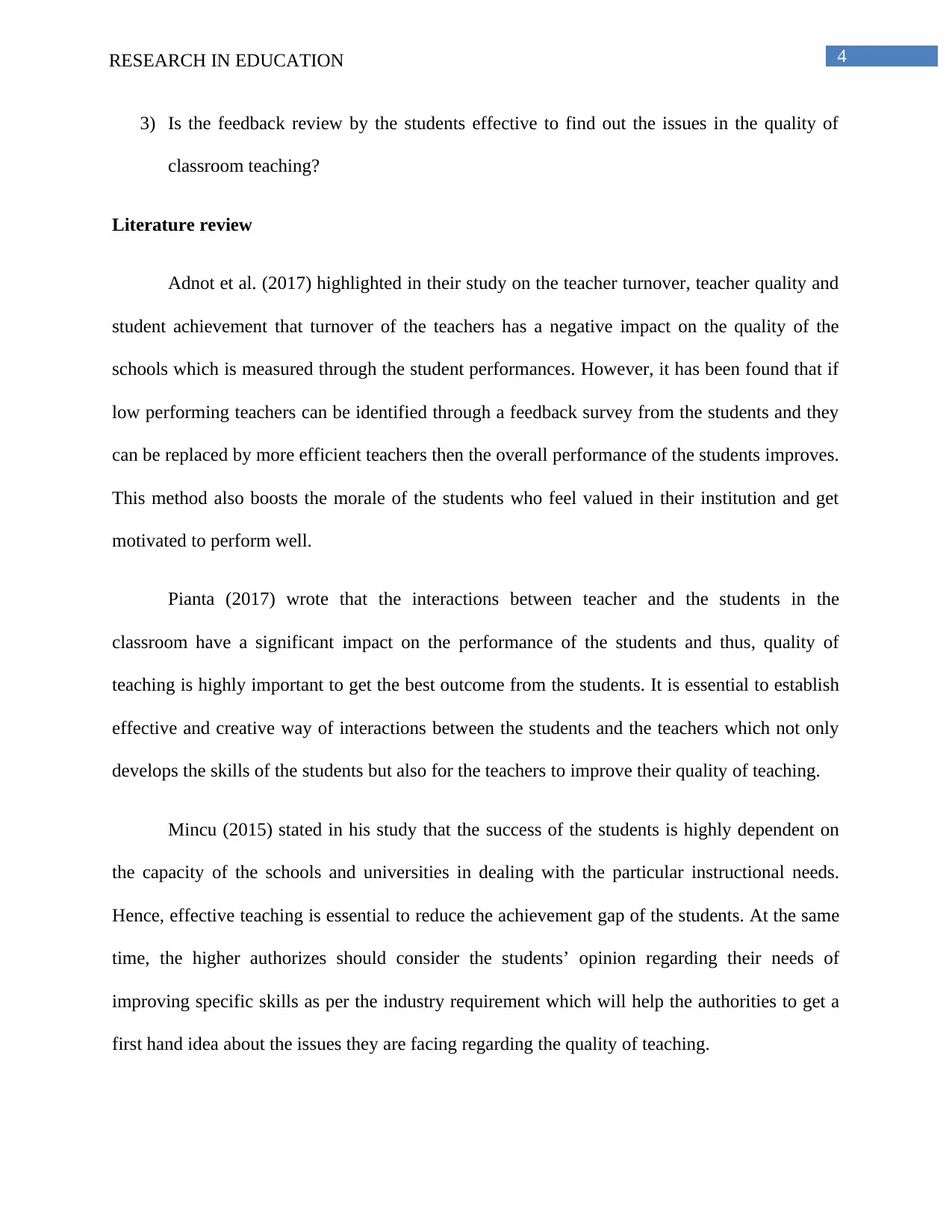
4RESEARCH IN EDUCATION
3) Is the feedback review by the students effective to find out the issues in the quality of
classroom teaching?
Literature review
Adnot et al. (2017) highlighted in their study on the teacher turnover, teacher quality and
student achievement that turnover of the teachers has a negative impact on the quality of the
schools which is measured through the student performances. However, it has been found that if
low performing teachers can be identified through a feedback survey from the students and they
can be replaced by more efficient teachers then the overall performance of the students improves.
This method also boosts the morale of the students who feel valued in their institution and get
motivated to perform well.
Pianta (2017) wrote that the interactions between teacher and the students in the
classroom have a significant impact on the performance of the students and thus, quality of
teaching is highly important to get the best outcome from the students. It is essential to establish
effective and creative way of interactions between the students and the teachers which not only
develops the skills of the students but also for the teachers to improve their quality of teaching.
Mincu (2015) stated in his study that the success of the students is highly dependent on
the capacity of the schools and universities in dealing with the particular instructional needs.
Hence, effective teaching is essential to reduce the achievement gap of the students. At the same
time, the higher authorizes should consider the students’ opinion regarding their needs of
improving specific skills as per the industry requirement which will help the authorities to get a
first hand idea about the issues they are facing regarding the quality of teaching.
3) Is the feedback review by the students effective to find out the issues in the quality of
classroom teaching?
Literature review
Adnot et al. (2017) highlighted in their study on the teacher turnover, teacher quality and
student achievement that turnover of the teachers has a negative impact on the quality of the
schools which is measured through the student performances. However, it has been found that if
low performing teachers can be identified through a feedback survey from the students and they
can be replaced by more efficient teachers then the overall performance of the students improves.
This method also boosts the morale of the students who feel valued in their institution and get
motivated to perform well.
Pianta (2017) wrote that the interactions between teacher and the students in the
classroom have a significant impact on the performance of the students and thus, quality of
teaching is highly important to get the best outcome from the students. It is essential to establish
effective and creative way of interactions between the students and the teachers which not only
develops the skills of the students but also for the teachers to improve their quality of teaching.
Mincu (2015) stated in his study that the success of the students is highly dependent on
the capacity of the schools and universities in dealing with the particular instructional needs.
Hence, effective teaching is essential to reduce the achievement gap of the students. At the same
time, the higher authorizes should consider the students’ opinion regarding their needs of
improving specific skills as per the industry requirement which will help the authorities to get a
first hand idea about the issues they are facing regarding the quality of teaching.
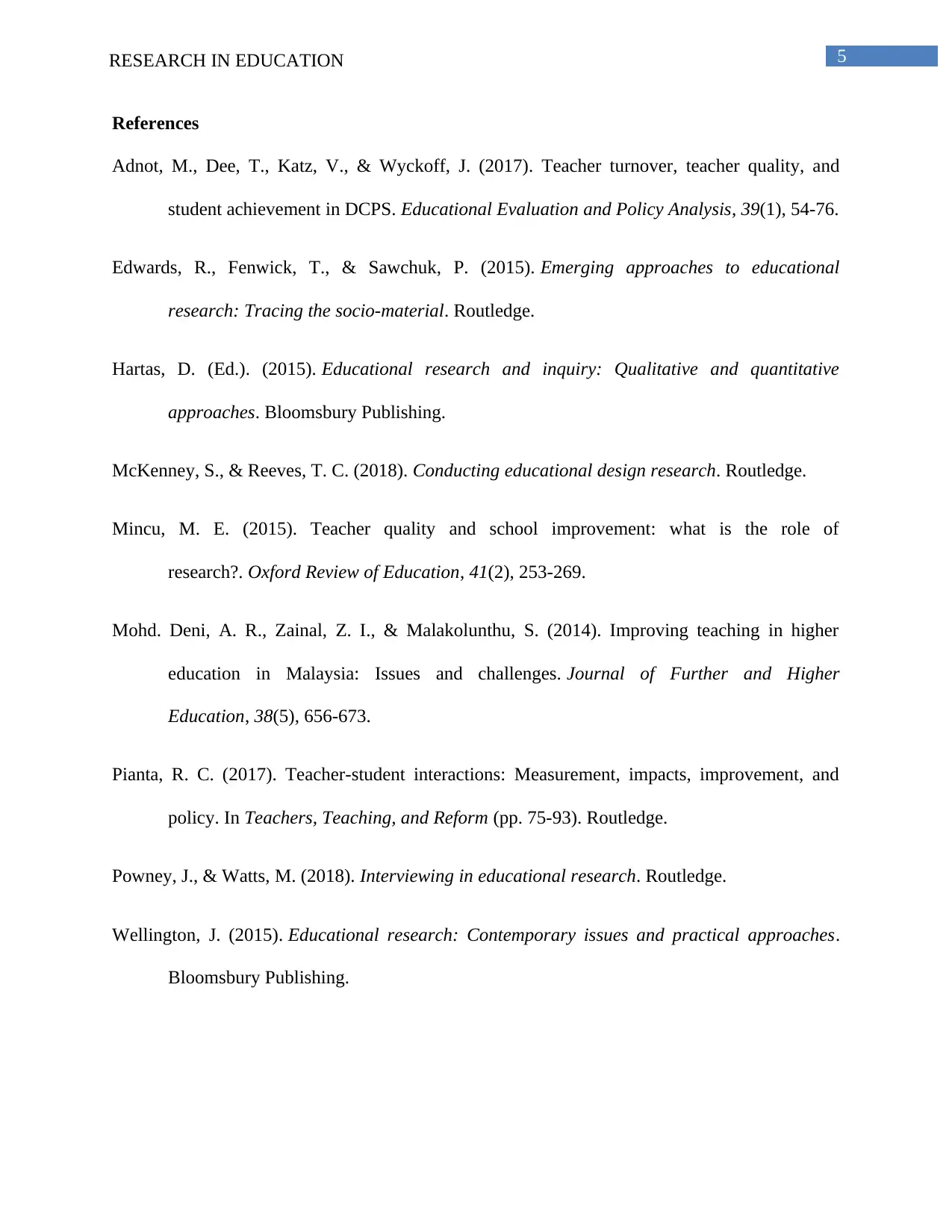
5RESEARCH IN EDUCATION
References
Adnot, M., Dee, T., Katz, V., & Wyckoff, J. (2017). Teacher turnover, teacher quality, and
student achievement in DCPS. Educational Evaluation and Policy Analysis, 39(1), 54-76.
Edwards, R., Fenwick, T., & Sawchuk, P. (2015). Emerging approaches to educational
research: Tracing the socio-material. Routledge.
Hartas, D. (Ed.). (2015). Educational research and inquiry: Qualitative and quantitative
approaches. Bloomsbury Publishing.
McKenney, S., & Reeves, T. C. (2018). Conducting educational design research. Routledge.
Mincu, M. E. (2015). Teacher quality and school improvement: what is the role of
research?. Oxford Review of Education, 41(2), 253-269.
Mohd. Deni, A. R., Zainal, Z. I., & Malakolunthu, S. (2014). Improving teaching in higher
education in Malaysia: Issues and challenges. Journal of Further and Higher
Education, 38(5), 656-673.
Pianta, R. C. (2017). Teacher-student interactions: Measurement, impacts, improvement, and
policy. In Teachers, Teaching, and Reform (pp. 75-93). Routledge.
Powney, J., & Watts, M. (2018). Interviewing in educational research. Routledge.
Wellington, J. (2015). Educational research: Contemporary issues and practical approaches.
Bloomsbury Publishing.
References
Adnot, M., Dee, T., Katz, V., & Wyckoff, J. (2017). Teacher turnover, teacher quality, and
student achievement in DCPS. Educational Evaluation and Policy Analysis, 39(1), 54-76.
Edwards, R., Fenwick, T., & Sawchuk, P. (2015). Emerging approaches to educational
research: Tracing the socio-material. Routledge.
Hartas, D. (Ed.). (2015). Educational research and inquiry: Qualitative and quantitative
approaches. Bloomsbury Publishing.
McKenney, S., & Reeves, T. C. (2018). Conducting educational design research. Routledge.
Mincu, M. E. (2015). Teacher quality and school improvement: what is the role of
research?. Oxford Review of Education, 41(2), 253-269.
Mohd. Deni, A. R., Zainal, Z. I., & Malakolunthu, S. (2014). Improving teaching in higher
education in Malaysia: Issues and challenges. Journal of Further and Higher
Education, 38(5), 656-673.
Pianta, R. C. (2017). Teacher-student interactions: Measurement, impacts, improvement, and
policy. In Teachers, Teaching, and Reform (pp. 75-93). Routledge.
Powney, J., & Watts, M. (2018). Interviewing in educational research. Routledge.
Wellington, J. (2015). Educational research: Contemporary issues and practical approaches.
Bloomsbury Publishing.
⊘ This is a preview!⊘
Do you want full access?
Subscribe today to unlock all pages.

Trusted by 1+ million students worldwide
1 out of 6
Related Documents
Your All-in-One AI-Powered Toolkit for Academic Success.
+13062052269
info@desklib.com
Available 24*7 on WhatsApp / Email
![[object Object]](/_next/static/media/star-bottom.7253800d.svg)
Unlock your academic potential
Copyright © 2020–2026 A2Z Services. All Rights Reserved. Developed and managed by ZUCOL.




